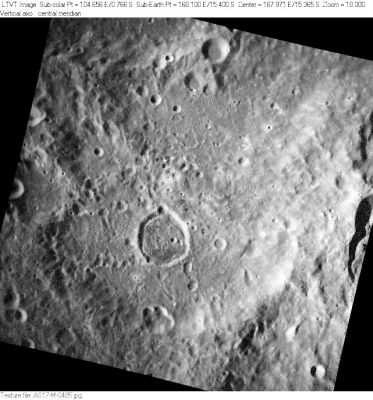Zwicky
Contents
Zwicky (and Zwicky N, aka Ibn Hayyan, on its floor)
| Lat: 15.4°S, Long: 168.1°E, Diam: 150 km, Depth: km, Rükl: (farside) |
AS17-M-0485 The southern rim of Zwicky is well defined in this photo. To the north it is overlaid by Heaviside K.
The prominent crater on Zwicky's floor is Zwicky N, also known as Ibn Hayyan during the making of the Lunar Topographic Orthophotomaps (LTO).
Images
- Zwicky is too recent a name to appear in the indices to the LPI's on-line Lunar Orbiter or Apollo atlases, however it can be found between Heaviside and Vertregt, to the west of Aitken. For example in: Lunar Orbiter II-075-M and Apollo AS17-M-0485, AS17-M-0683, and AS17-M-1108
- The somewhat hexagon-shaped crater Zwicky N (the LTO's Ibn Hayyan) is seen in Apollo 8's orbital photograph AS08-13-2325, which shows the crater illuminated by high sun. See also Apollo 17's AS17-154-23687. Research Danny Caes
- There is also a nice image from APOLLO OVER THE MOON: A VIEW FROM ORBIT (NASA SP-362) showing the interior of the prominent 30 km crater Zwicky N, inside Zwicky.
- See also Frame 69 on Don P. Mitchell's Soviet Moon Images page, made by ZOND 8, in 1970. In this image, Zwicky and Zwicky N are rightward of the central cross. North is to the left. Research: Danny Caes
Maps
(LAC zone 85 and 103 - center point is in zone 85C3)
LM-103 LTO-85C3 - northern half LTO-103B2 - southern half USGS Nomenclature map
Description
The impact crater Zwicky is overlaid on the north by the similar 110 km crater Heaviside K.
Description: Wikipedia
Additional Information
Nomenclature
- Named for Fritz Zwicky (February 14, 1898 – February 8, 1974) , an American-based Swiss astronomer. He was an original thinker, with many important contributions in theoretical and observational astronomy. An anecdote often told of Zwicky concerns an informal experiment to see if he could reduce problems with turbulence hindering an observation session one night at Mount Wilson observatory. He told his assistant to fire a gun out through the telescope slit, in the hope it would help to smooth out the turbulence. No effect was noticed, but the event shows the kind of lateral thinking for which Zwicky was famous.
- This name was added to the IAU nomenclature in 1979.
- The northern boundary of Zwicky is not well defined. The diameter of 150 km given in the IAU Planetary Gazetteer corresponds to the east-west width of the southern piece not overlain by Heaviside K. LTO-85C3 does not make it clear if the name was meant to encompass a complete 150 km circle around the center point or just the irregularly shaped southern piece. - Jim Mosher
- The map sheet LTO-85C3 was given the provisional name "Ibn Hayyan". The map-makers presumably expected that this name would eventually be approved to replace Zwicky N as the designation for the prominent 30 km crater within the main one, and hence that this would be a suitable title for the sheet. But "Ibn Hayyan" is one of many names appearing on the LTO charts that were never approved. That a name used to title a sheet was not subsequently approved is slightly unusual. - Jim Mosher
- Wikipedia page Ibn Hayyan.
- Three orbital Hasselblad photographs, made by Apollo 17, show Zwicky N ("Ibn Hayyan") in close up (on color-film, Magazine KK). The central one of the three photographs is AS17-149-22804, and a black-and-white Hasselblad of "Ibn Hayyan" is AS17-154-23687- DannyCaes Nov 28, 2007
- Is there really no other name following the (officially recognized) last name of the lunar nomenclature's alphabet? (from Abbe to Zwicky). - DannyCaes May 23, 2017
LPOD Articles
Bibliography
GEOLOGIE AUF DEM MOND (J.E.Guest/ R.Greeley), seite 164 (abbildung 9.1.).
- Zwicky N ("Ibn Hayyan"):
APOLLO OVER THE MOON; A VIEW FROM ORBIT, Chapter 7: Unusual Features (Part 2), Figure 236.
Fritz Zwicky is frequently mentioned in Burnham's Celestial Handbook. The amount of pages in which the name Zwicky is printed is not small. - DannyCaes May 15, 2015
Fritz Zwicky in the Sourcebook Project (William R. Corliss)
- In Mysterious Universe, a handbook of astronomical anomalies (1979) :
- Page 588: Oddballs and Galaxy Formation (James Binney, Nature, 1975).
- Page 589: The Nature of Hoag's Object (Robert W. O'Connell, Astrophysical Journal, 1974).
- Page 622: On the Nature of Mass (F.Hoyle and J.V.Narlikar, Nature, 1971).
- Page 638: Superclusters: Fact or Fancy? (Jon Darius, New Scientist, 1977).
Zwicky and "Aerial Blobs"
On pages 200 and 201 of William R. Corliss' book Rare Halos, Mirages, Anomalous Rainbows, and related electromagnetic phenomena (the Sourcebook Project, 1984), there's a curious article by F.Zwicky, about "Aerial Blobs" (-Shadow Bands seen through the Telescope-, Science, 1955).
